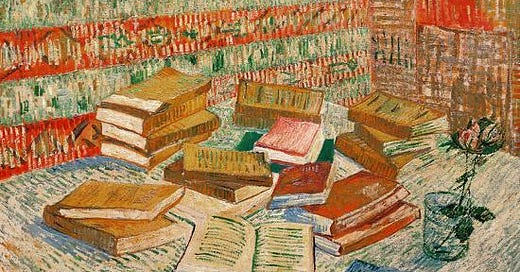The Yellow Books by Vincent van Gogh
One of the weirdest byproducts of being a professional book critic is that you’re expected, on the spot, to provide recommendations for every last person who finds out what you do. Luckily, I have a pretty photographic memory of what I’ve read and I think in categories (books set in cold climates, books about doppelgängers, books featuring improbably attractive heroines, etc), so I can usually come up with one or two hits right away. (For everyone, that is, but my family, who insist that my tastes are too dour for them, as if anyone ever truly loved a Happy Book.)
I’ve been considering what a Substack like mine ought to do, besides share the random shit I find and like and occasionally gripe about the state of the (literary) world. So I’ve decided to launch a column, a la Dear Polly or Dear Sugar except I can only solve your literary problems and not your existential ones. (Now the books, on the other hand, might be able to solve—or exacerbate?—those problems. Remember, reading is an emotional contact sport.)
Every few weeks I’ll solve some poor reader’s dilemma, offering them three books that I think fit their criteria. Here’s how it will work:*
Simply reply to this email, or any Substack from me, and provide the following info:
The titles of three books you could not live without (e.g. Jane Eyre by Charlotte Brontë; Tomorrow, and Tomorrow, and Tomorrow by Gabrielle Zevin; The Picnic at Hanging Rock by Joan Lindsay)
Three adjectives, phrases, or ideas that you’re hoping to get a feel for in your recommended books (e.g. formally exciting books, books that feel cozy, books set in Japan). It can be a feeling or the whisper of an idea, even a memory of how it felt to read another book, i.e. “Please recommend a novel that will make me feel the same way I felt first reading Crossing to Safety by Wallace Stegner”—although that one is a high bar.
To kick things off, a close friend who I’ll call Jenny L. (because that’s her name) recently asked me for a recommendation of something that was “short, classic, under-appreciated.” She helpfully sent me three of her all-time favorite novels—Drown by Junot Diaz, Skippy Dies by Paul Murray, and Beloved by Toni Morrison—and three of her more recent loves—The Ministry of Time by Kaliane Bradley, My Name is Lucy Barton by Elizabeth Strout, and The Hypocrite by Jo Hamya.
So here goes:
Recommendation 1:
The Employees by Olga Ravn (144 pp.)
Strange bureaucracies have a hold on me (probably because I live on Capitol Hill in DC, and one of the largest strange bureaucracies in the world is in my front yard). In The Employees, by Danish novelist Olga Ravn (who has a new novel, The Wax Child, due out this fall) a group of humans and humanoids aboard a spaceship report back to their overlords about how their work is progressing—and how the bizarre objects that are being brought back from a nearby planet are affecting the way they feel about their (in)organic bodies and minds. Written in the form of non-chronological memos from the employees, it’s brisk but jam-packed with stirring ruminations on the fallibility of the human mind and whether, at this stage of capitalism, people can be more than their work. Prepare yourself for a firehose of despair—and hope.
Recommendation 2:
Jacob’s Room by Virginia Woolf (180 pp.)
Jacob’s Room doesn’t always garner the attention it deserves, especially compared to its big sisters Mrs. Dalloway and To the Lighthouse. But not only does it have the appeal of a sideways biographical novel like My Name is Lucy Barton, it also shows Virginia Woolf just as she was coming into her powers. The titular Jacob isn’t so much a protagonist as a hole at the center of the story that other characters attempt to fill in: Woolf essentially took apart the foundations of the novel and then reassembled them into her first truly Modernist work. But while the format was experimental, the spirit of Jacob’s Room has the same beautiful melancholy that moves through all her work, the sense that the world is simply too much, but small moments of acute attention and witness provide solace.
Recommendation 3:
Our Spoons Came from Woolworth’s by Barbara Comyns (196 pp.)
What even is this novel? Tragedy, comedy, total gonzo social analysis, all in the form of a young wife’s bildungsroman? Only Barbara Comyns, whose life is worth a long Wikipedia rabbit hole dive (a childhood straight out of We Capture the Castle, a job breeding poodles, etc etc) could have come up with the story of Sophia Fairclough, who is 21, secretly married, and now setting up house with absolutely no money in Depression-era London. Absurdity—and a lot of tears—ensue, especially because Sophia is the kind of woman who thinks, “I had a kind of idea if you controlled your mind and said ‘I won’t have any babies’ very hard, they most likely wouldn’t come.” (Spoiler: A baby does indeed come.) Comyns, who never gets her due, is one of the great underrated dark comedians of fiction.
Looking forward to seeing what you have in store for me!
*Nota Bene: Anyone will be able to access my first rec, but only subscribers will be able to see the second two, just to keep up that *veil of mystery* (and attract subscribers, dammit).





3 books I could not live without.
Jane Eyre- Charlotte Brontë
The Colour Purple- Alice Walker
Eve’s Hollywood- Eve Babitz
This was so hard - I thought of so many books. But this narrows down a type of book I love.
I used to think Fifth Business by Robertson Davies was the perfect novel. Maybe it is
I adore Barbara Comyns I agree she has never gotten her due. I’ve read Their Spoons Came from Woolworth’s about 5 d and all her other books too.